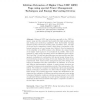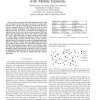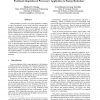718 search results - page 31 / 144 » Energy saving and network performance: a trade-off approach |
DAGSTUHL
2007
13 years 9 months ago
2007
Abstract. Enhanced RFID tag technology especially in the UHF frequency range provides extended functionality like high operating range and sensing and monitoring capabilities. Such...
TMC
2008
13 years 7 months ago
2008
Recent research shows that significant energy saving can be achieved in wireless sensor networks by using mobile elements (MEs) capable of carrying data mechanically. However, the ...
ISCA
2003
IEEE
14 years 1 months ago
2003
IEEE
Although adaptive processors can exploit application variability to improve performance or save energy, effectively managing their adaptivity is challenging. To address this probl...
WICOMM
2008
13 years 7 months ago
2008
This paper explores the logical device aggregation of terminals in future generation networks, where the availability of several different radio access techniques is integrated by...
DASFAA
2009
IEEE
13 years 11 months ago
2009
IEEE
Abstract. The suppression scheme is a solution for limited energy constraints in sensor networks. Temporal suppression, spatial suppression and spatio-temporal suppression are prop...



